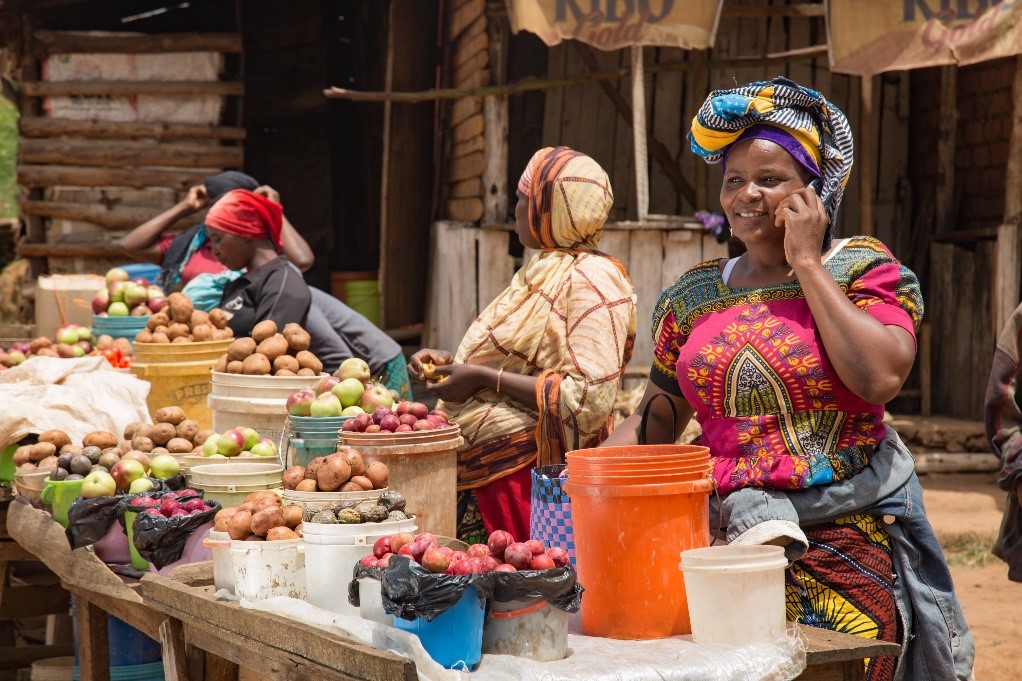Strictly Personal
Forget ChatGPT: Greatest tech coup is phones for rural women, By Nicoline De Haan
Published
1 year agoon

While 100 million people worldwide are using the AI chatbot ChatGPT to get ahead on homework and try out for top jobs at Google, more than 370 million women in developing countries lack the services of a simple cellphone.
The world may be witnessing a quantum leap in the digital revolution, but cellphones and mobile internet would give these women enough foothold to access opportunities to improve their incomes, nutrition and health.
For rural women and girls in low-income countries who rely on small-scale agriculture, ICT can unlock financial services, training and networks and, importantly, information and knowledge. Without these core technologies, women are farming with one hand tied behind their backs, making up just a quarter of registered users of agricultural applications in Africa.
Transform farming
The potential of digital technology to transform farming and agriculture in countries across the Global South is increasingly compelling. Producers in sub-Saharan Africa who adopted online services were found to increase their incomes by up to 40 percent while new forecasting and early warning systems can also help farmers stay ahead of climate shocks. Digital innovations are therefore an essential component of agricultural research strategies to strengthen food and economic security around the world.
Subsidising technologies like cellphones for women can be one effective way for governments and NGOs to start closing the digital gender divide while boosting agricultural productivity.
Women in sub-Saharan Africa are 15 percent less likely to own a cellphone and more than 40 percent less likely to use mobile internet than men. Yet, when women were given cellphones, SIM cards and time charge cards, in one study in Tunisia, 75 percent said they benefited either through better connectivity to agricultural information, such as veterinary advice, or greater levels of communication.
Meanwhile, a project to provide app-based drone delivery of livestock vaccines is set to allow women in Ghana to overcome gender norms that dictate men farmers liaise with men veterinarians, and better care for their chickens and goats.
Gender-responsive research
But, to ensure that women get maximum benefit, both the technology and the training to use it must be optimised to account for different needs and contexts — and this needs ongoing investment into gender-responsive agricultural research.
While cellphones and SMS have increased the reach of agricultural information services, disproportionate levels of illiteracy among women require innovative forms of delivery to be impactful. For example, developing interactive voice response technology and voice messages in local languages can allow women to receive the same valuable information in a format that acknowledges gendered differences in education levels.
Similarly, complementary technologies ensure that greater access translates into greater benefit. Using radio programming in combination with SMS, and avoiding gendered greetings such as “dear brother farmer,” can improve both women’s access to and capacity to leverage information.
Norms barrier
Perhaps the greatest barrier when it comes to closing the digital gender divide are the norms that continue to limit women’s access to technology, and the slow social and cultural acceptance of women making use of digital tools in agriculture.
One approach is to support efforts to work with the gatekeepers of technology within the community, whether fathers, clerics or elders, to encourage behaviour change. Another promising tactic is for governments and research partners to develop community-based opportunities for women to access and act upon information technologies collectively.
Radio Listeners Clubs in Rwanda were found to help remove the significant disparities in awareness, access and use of climate information that usually exist between women and men smallholder farmers. The greatest improvements in income and social standing, as a result, were among women.
Digital innovations can themselves play a part in deconstructing gender norms. #BintiShujaaz (“Heroine Girl”), a social media campaign launched in Tanzania, used posts, videos, comics and two online panel discussions to showcase positive examples of young women in the chicken business. The campaign reached 4.4 million young Tanzanians, with more than 500,000 engagements, to help improve the perception of women in the poultry business.
Access to information through digital technologies can be a powerful leveller and a critical weapon in the arsenal. And when it comes to gender inequality, it can generate multiple benefits, not only for women but for their families, communities, and economies.
It is vital that governments, development partners, and agricultural research institutes do everything they can to ensure women not only have access to the information and knowledge they need but are empowered to use it in their best interests.
Dr. Nicoline de Haan is director of the CGIAR GENDER Impact Platform; ©IPS
You may like
-


Air Peace, capitalism and national interest, By Dakuku Peterside
-


This is chaos, not governance, and we must stop it, By Tee Ngugi
-


Off we go again with public shows, humbug and clowning, By Jenerali Uliwengu
-


How patriarchy underpins gender violence today, By Tee Ngugi
-


Help! There’s a dangerous, secret plot to save the EAC from imminent death, By Charles Onyango-Obbo
-


How South Africa, US elections could shape Tshisekedi’s bread in Kinshasa, By Charles Onyango-Obbo
Strictly Personal
Air Peace, capitalism and national interest, By Dakuku Peterside
Published
2 days agoon
April 16, 2024
Nigerian corporate influence and that of the West continue to collide. The rationale is straightforward: whereas corporate activity in Europe and America is part of their larger local and foreign policy engagement, privately owned enterprises in Nigeria or commercial interests are not part of Nigeria’s foreign policy ecosystem, neither is there a strong culture of government support for privately owned enterprises’ expansion locally and internationally.
The relationship between Nigerian businesses and foreign policy is important to the national interest. When backing domestic Nigerian companies to compete on a worldwide scale, the government should see it as a lever to drive foreign policy, and national strategic interest, promote trade, enhance national security considerations, and minimize distortion in the domestic market as the foreign airlines were doing, boost GDP, create employment opportunities, and optimize corporate returns for the firms.
Admitted nations do not always interfere directly in their companies’ business and commercial dealings, and there are always exceptions. I can cite two areas of exception: military sales by companies because of their strategic implications and are, therefore, part of foreign and diplomatic policy and processes. The second is where the products or routes of a company have implications for foreign policy. Air Peace falls into the second category in the Lagos – London route.
Two events demonstrate an emerging trend that, if not checked, will disincentivize Nigerian firms from competing in the global marketplace. There are other notable examples, but I am using these two examples because they are very recent and ongoing, and they are typological representations of the need for Nigerian government backing and support for local companies that are playing in a very competitive international market dominated by big foreign companies whose governments are using all forms of foreign policies and diplomacy to support and sustain.
The first is Air Peace. It is the only Nigerian-owned aviation company playing globally and checkmating the dominance of foreign airlines. The most recent advance is the commencement of flights on the Lagos – London route. In Nigeria, foreign airlines are well-established and accustomed to a lack of rivalry, yet a free-market economy depends on the existence of competition. Nigeria has significantly larger airline profits per passenger than other comparable African nations. Insufficient competition has resulted in high ticket costs and poor service quality. It is precisely this jinx that Air Peace is attempting to break.
On March 30, 2024, Air Peace reciprocated the lopsided Bilateral Air Service Agreement, BASA, between Nigeria and the United Kingdom when the local airline began direct flight operations from Lagos to Gatwick Airport in London. This elicited several reactions from foreign airlines backed by their various sovereigns because of their strategic interest. A critical response is the commencement of a price war. Before the Air Peace entry, the price of international flight tickets on the Lagos-London route had soared to as much as N3.5 million for the economy ticket. However, after Air Peace introduced a return economy class ticket priced at N1.2 million, foreign carriers like British Airways, Virgin Atlantic, and Qatar Airways reduced their fares significantly to remain competitive.
In a price war, there is little the government can do. In an open-market competitive situation such as this, our government must not act in a manner that suggests it is antagonistic to foreign players and competitors. There must be an appearance of a level playing field. However, government owes Air Peace protection against foreign competitors backed by their home governments. This is in the overall interest of the Nigerian consumer of goods and services. Competition history in the airspace works where the Consumer Protection Authority in the host country is active. This is almost absent in Nigeria and it is a reason why foreign airlines have been arbitrary in pricing their tickets. Nigerian consumers are often at the mercy of these foreign firms who lack any vista of patriotism and are more inclined to protect the national interest of their governments and countries.
It would not be too much to expect Nigerian companies playing globally to benefit from the protection of the Nigerian government to limit influence peddling by foreign-owned companies. The success of Air Peace should enable a more competitive and sustainable market, allowing domestic players to grow their network and propel Nigeria to the forefront of international aviation.
The second is Proforce, a Nigerian-owned military hardware manufacturing firm active in Rwanda, Chad, Mali, Ghana, Niger, Burkina Faso, and South Sudan. Despite the growing capacity of Proforce in military hardware manufacturing, Nigeria entered two lopsided arrangements with two UAE firms to supply military equipment worth billions of dollars , respectively. Both deals are backed by the UAE government but executed by UAE firms.
These deals on a more extensive web are not unconnected with UAE’s national strategic interest. In pursuit of its strategic national interest, India is pushing Indian firms to supply military equipment to Nigeria. The Nigerian defence equipment market has seen weaker indigenous competitors driven out due to the combination of local manufacturers’ lack of competitive capacity and government patronage of Asian, European, and US firms in the defence equipment manufacturing sector. This is a misnomer and needs to be corrected.
Not only should our government be the primary customer of this firm if its products meet international standards, but it should also support and protect it from the harsh competitive realities of a challenging but strategic market directly linked to our national military procurement ecosystem. The ability to produce military hardware locally is significant to our defence strategy.
This firm and similar companies playing in this strategic defence area must be considered strategic and have a considerable place in Nigeria’s foreign policy calculations. Protecting Nigeria’s interests is the primary reason for our engagement in global diplomacy. The government must deliberately balance national interest with capacity and competence in military hardware purchases. It will not be too much to ask these foreign firms to partner with local companies so we can embed the technology transfer advantages.
Our government must create an environment that enables our local companies to compete globally and ply their trades in various countries. It should be part of the government’s overall economic, strategic growth agenda to identify areas or sectors in which Nigerian companies have a competitive advantage, especially in the sub-region and across Africa and support the companies in these sectors to advance and grow to dominate in the African region with a view to competing globally. Government support in the form of incentives such as competitive grants ,tax credit for consumers ,low-interest capital, patronage, G2G business, operational support, and diplomatic lobbying, amongst others, will alter the competitive landscape. Governments and key government agencies in the west retain the services of lobbying firms in pursuit of its strategic interest.
Nigerian firms’ competitiveness on a global scale can only be enhanced by the support of the Nigerian government. Foreign policy interests should be a key driver of Nigerian trade agreements. How does the Nigerian government support private companies to grow and compete globally? Is it intentionally mapping out growth areas and creating opportunities for Nigerian firms to maximize their potential? Is the government at the domestic level removing bottlenecks and impediments to private company growth, allowing a level playing field for these companies to compete with international companies?
Why is the government patronising foreign firms against local firms if their products are of similar value? Why are Nigerian consumers left to the hands of international companies in some sectors without the government actively supporting the growth of local firms to compete in those sectors? These questions merit honest answers. Nigerian national interest must be the driving factor for our foreign policies, which must cover the private sector, just as is the case with most developed countries. The new global capitalism is not a product of accident or chance; the government has choreographed and shaped it by using foreign policies to support and protect local firms competing globally. Nigeria must learn to do the same to build a strong economy with more jobs.
Strictly Personal
This is chaos, not governance, and we must stop it, By Tee Ngugi
Published
1 week agoon
April 10, 2024
The following are stories that have dominated mainstream media in recent times. Fake fertiliser and attempts by powerful politicians to kill the story. A nation of bribes, government ministries and corporations where the vice is so routine that it has the semblance of policy. Irregular spending of billions in Nairobi County.
Billions are spent in all countries on domestic and foreign travel. Grabbing of land belonging to state corporations, was a scam reminiscent of the Kanu era when even public toilets would be grabbed. Crisis in the health and education sectors.
Tribalism in hiring for state jobs. Return of construction in riparian lands and natural waterways. Relocation of major businesses because of high cost of power and heavy taxation. A tax regime that is so punitive, it squeezes life out of small businesses. Etc, ad nauseam.
To be fair, these stories of thievery, mismanagement, negligence, incompetence and greed have been present in all administrations since independence.
However, instead of the cynically-named “mama mboga” government reversing this gradual slide towards state failure, it is fuelling it.
Alternately, it’s campaigning for 2027 or gallivanting all over the world, evoking the legend of Emperor Nero playing the violin as Rome burned.
A government is run based on strict adherence to policies and laws. It appoints the most competent personnel, irrespective of tribe, to run efficient departments which have clear-cut goals.
It aligns education to its national vision. Its strategies to achieve food security should be driven by the best brains and guided by innovative policies. It enacts policies that attract investment and incentivize building of businesses. It treats any kind of thievery or negligence as sabotage.
Government is not a political party. Government officials should have nothing to do with political party matters. They should be so engaged in their government duties that they literally would not have time for party issues. Government jobs should not be used to reward girlfriends and cronies.
Government is exhausting work undertaken because of a passion to transform lives, not for the trappings of power. Government is not endless campaigning to win the next election. To his credit, Mwai Kibaki left party matters alone until he had to run for re-election.
We have corrupted the meaning of government. We have parliamentarians beholden to their tribes, not to ideas.
We have incompetent and corrupt judges. We have a civil service where you bribe to be served. Police take bribes to allow death traps on our roads. We have urban planners who plan nothing except how to line their pockets. We have regulatory agencies that regulate nothing, including the intake of their fat stomachs.
We have advisers who advise on which tenders should go to whom. There is no central organising ethos at the heart of government. There is no sense of national purpose. We have flurries of national activities, policies, legislation, appointments which don’t lead to meaningful growth. We just run on the same spot.
Tee Ngugi is a Nairobi-based political commentator
EDITOR’S PICK


Top European, Asian clubs on alert as Super Eagles keeper set to make contract decision
Some top clubs in Europe and Asia have been put on alert as Super Eagles and Chippa United goalkeeper, Stanley...


IMF says South Africa needs to do more to cut spending, lower debt-to-GDP ratio
A top official from the International Monetary Fund has revealed that South Africa needs to do more to cut spending...


Burkina Faso expels 3 French diplomats over ‘subversive activities’
According to a letter quoted by Reuters on Thursday, three French diplomats have been sent back to France by Burkina...


Nigeria’s MAX partners Ghana’s Kofa in e-bike financing deal
Nigeria’s electric vehicle solutions provider, MAX, has announced striking a partnership deal with Ghana’s innovator in energy networks, Kofa, that...


Zambia asks EU to help strengthen its democratic initiatives ahead of 2026 elections
The Zambian government has called on the European Union (EU) to help in strengthening democratic initiatives in the country as...


Nigeria destined to become major global economy under Tinubu— VP Shettima
Nigeria’s Vice President, Kashim Shettima, has predicted that the country is destined to become a major economic force in the...


Nigeria’s central bank insists depleting external reserves not due to Naira defence
According to the Central Bank of Nigeria (CBN), the big drop in the country’s foreign exchange reserves was not due...


African Guarantee Fund partners Nordic Development Fund to launch green finance in Nigeria
The African Guarantee Fund (AGF) has teamed up with the Nordic Development Fund (NDF) to launch a green finance fund...


Ethiopia’s Lemma, Kenya’s Obiri give Africa double podium finish at Boston Marathon
Ethiopia’s long distance runner, Sisay Lemma, and Kenyan female marathon sensation, Hellen Obiri, teamed up to give Africa a double...


Davido’s ‘Unavailable’ achieves milestone with 100 million views on YouTube, Spotify
Nigeria’s Afrobeats sensation, David Adeleke, popularly known as Davido, has landed another milestone after his hit single, “Unavailable’, surpassed 100...
Trending
-

 Sports1 day ago
Sports1 day agoEthiopia’s Lemma, Kenya’s Obiri give Africa double podium finish at Boston Marathon
-

 Metro1 day ago
Metro1 day agoZambia: Many feared injured as UPND, PF supporters clash in court
-

 Culture1 day ago
Culture1 day agoDavido’s ‘Unavailable’ achieves milestone with 100 million views on YouTube, Spotify
-

 VenturesNow1 day ago
VenturesNow1 day agoInvestors’ wealth drops by $968 million on Nairobi Securities Exchange


